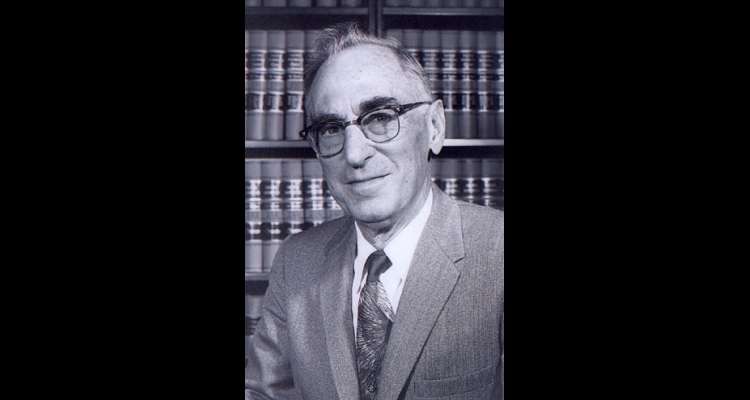Milton Badt
Milton Benjamin Badt (1884-1966) considered himself a Nevadan although he was born in San Francisco and received most of his formal education in California. He established a law practice in Elko and became District Judge before his appointment to the Nevada Supreme Court in 1947. Paul Leonard, editor of the Elko Daily Free Press and the Nevada State Journal, characterized Badt "as brilliant a man as there'd ever been in the state of Nevada."
Badt was the ninth child of Morris Badt and Lina Posener. Morris immigrated from Polish Prussia, settled in Elko in 1868, married Lina Posener, and became a merchant and rancher in Wells. The couple built a home in San Francisco, where Lina reared their children in an Orthodox Jewish household. Milton spent summers and holidays in Wells. When his father developed terminal cancer the family moved to Wells, where Milton attended the town's two-room school for several years. He later claimed that his schooling in the small Nevada community was superior to that in San Francisco. After his father's death in 1899, Milton returned to the Bay Area and graduated from the University of California in 1906, with a flair for languages which included Hebrew. He studied law at Hastings and, after a brief apprenticeship in San Francisco, opened a law practice in Elko.
Badt specialized in water and land law, represented the Western Shoshone seeking redress of grievances, and became district judge for Elko County in 1945. Two years later, Democratic governor Vail Pittman appointed the Republican Badt to a vacancy on the Nevada Supreme Court. He ran unopposed four times. Many acclaimed his decisions for their fairness and clarity. In King v. Board of Regents of the University of Nevada (1948), he wrote the majority opinion that the establishment of a board of seven advisory regents appointed by the governor was unconstitutional. Badt thereby reinforced what he considered the intent of the state founders that the university be governed by elected officials. In one highly publicized opinion (Richardson v. Board of Regents of the University of Nevada (1954), Badt ruled for the court that criticism of university policy by faculty members did not constitute insubordination or cause for dismissal.
Lina Badt had required all her children to promise to marry Jewish. The dearth of Jewish women in Nevada nearly rendered Badt a bachelor, but after receiving a reprieve from Lina, Milton married gentile Gertrude Nizze in 1927. They had two children, Nancy and Milton, Jr. Badt never affiliated with a Jewish congregation in Nevada and practiced Judaism privately. He recited Kaddish from memory at a friend's funeral, once gathered available Carson City Jews for a mourning service, and celebrated both Jewish and Christian holidays with his family. When Badt died of pneumonia in 1966, colleagues remembered him as a judge with few peers, civically active, a cultured master of the English language, and a cherished husband and father.
Article Locations
Related Articles
None at this time.
